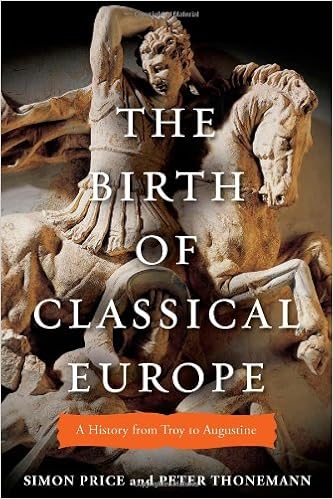This book is a great review of the rise and fall of classical Europe, from the earliest civilizations in Crete and Greece to the fall of the Roman Empire and the rise of Christianity. The authors are professional historians and remarkably free of either Left or Right wing cant. They provide an excellent summary of the rise of Mediterranean civilization and the origins of the notion of Europe. They manage to pack a remarkable amount of facts into this book, including quantitative data where possible (“X percent of all crockery at this site changed from Greek to Etruscan between Y and Z years” kind of thing). Greco-Roman nerds will know many more details obviously, but even they will not be disappointed with how much information and perspective the authors can fit into a small space. Well worth reading.
Capsule Review: The Birth of Classical Europe
Published by
Omar Ali
I am a physician interested in obesity and insulin resistance, and in particular in the genetics and epigenetics of obesity As a blogger, I am more interested in history, Islam, India, the ideology of Pakistan, and whatever catches my fancy. My opinions can change. View all posts by Omar Ali

This, so-called ‘classical Europe’ is the most falsified part of the world history…(some examples will follow)…
…American historian John Fine also calls Greeks forgers, for presenting and taking on the Cretan culture as their own…
…At the beginning of the 19th century Greeks were granted their state for the first time in their history, in which their first constitution proclaimed as “Greeks” all those who were of Orthodox faith, and since 1829 this state has been territorially expanded 11 times!
There are so many things to be said about ‘classical Europe’ and thanks to Omar for diverting our attention on this topic. I haven’t read the book, but I will try to find it. I think that SA people have no sense how this topic is closely related to their history. I already mentioned that it is probably one of the most fabricated topics in world history. I know that pundits are busy to explain the origin/meaning of SERINDIA and resolve this issue in this calendar year but let see the similar question related to this ‘classical’ topic.
What is the origin/meaning of the names GRECO-ROMAN (i.e. Greeks and Romans)?
I am pretty sure that this book does not say anything about that simply because this would uncover these ‘classical’ fabrications.
While pundits are making finishing touches on their explanations of origin/meaning of SERINDIA let help them in explaining the terms Greco and Roman. The reason for this is my impression that many pundits are over-impressed with these topics and accept everything without any questioning. An additional reason is that this part of EU history is closer related to SA history than the most of pundits think.
Let see for e.g. ROMANS (next time – Greeks).
For the beginning, where this name came from? The city of Rome was founded by refugees from Troy. None ever said that they were Greeks, however, many state that in Iliad Greeks lived and fought in Troy what is an indicative contradiction. These people called themselves Raseni, in history they are known as Etruscans (the meaning of this is the ‘liver’ – about this some other time). Greeks read ‘Raseni’ as ‘Thracians’ for whom, Herodotus said – they were the biggest nation in the world after Indians.
‘Raseni’ is the alternative name for Serbs. In the oldest Serbian history, the followers of the god Serbon were called Serbs (warriors) and the followers of the goddess Reasa (Rasa, Gea, Earth) were Raseni (agriculturists). These and other ranks were probably predecessors of the caste system in SA. There are many toponyms in Serbia with this word as a root. From this name also were formed names for Russia and Prussia while in Hungarian language this is still a word for Serbs.
Anyway, Raseni founded the city of Rome and gave it the name – Ruma, what is an archaic Serbian word for ‘place/space for living’. They developed well-known arts, architecture, aqueducts, libraries, etc. before there were later subjected to the genocide and destruction of all their texts by the official decision of the Roman Senate (some other time about this).
Ruma is also a name of the city 40km from Belgrade. There are also toponyms Ruma in SA. I suppose that the personal female name Ruma in India (famous fashion designer) is probably related to this word. In old Serbian, ‘ruma’ is also a name for the room, the word ‘podrum’ (literally – ‘under room’) is the name for the basement. English language adopted this word and they have the same pronunciation (en. ‘room’ = ser. ‘rum’).
Well, what we have – Roman (for e.g. soldiers) are actually ‘room soldiers’ ?, hard to believe, isn’t it? Doesn’t sound so ‘classical’?…Good opportunity to anyone to challenge any of the previous.
Happy New Year to pundits of all colours and stay tuned for another excited story about ‘classical’ Greeks!
In memoriam and homage to the old Etruscans and their leader Eney (Virgilio), there are pictures of Etruscans’ homeland (some may recognise the Russel Crows’ home in The Gladiator) which got the name after them – Tuscany (Toskana). Some very insightful will establish the linkage between the landscape and the meaning of the name of Raseni. All this, followed by the the music of –
André Rieu – Once Upon A Time In The West -TOSKANA (6 min).
https://www.youtube.com/watch?v=O0Umq_ajh7I
Andre’ Rieu – Chiquitita ABBA – Toskana (5 min)
https://www.youtube.com/watch?v=wmPJ-J-8F5s
Enjoy!